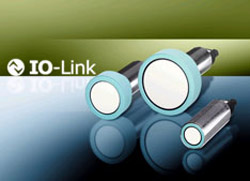IO-Link-compatible ultrasonic proximity switch for large sensing ranges

They are characterized by the high IP67 degree of protection, a significantly reduced blind zone, and a more compact design. Very little space is required at the machine.
The operating mode is convertible so that the new products can be used universally – as retroflective sensors, pushbuttons, or analog sensors. Typical applications include level detection, distance control, stack height detection, loop control, and monitoring of roller diameters.
The IO-Link compatibility of the new proximity switches offers users a number of advantages. These include, for example, simple and rapid device replacement without downtimes, with automatic reparameterization, monitoring of sensor status and temperature, dynamic parameterization of the measuring range limits, and rapid preventive diagnosis of disruptions.
To upgrade machinery flexibly and quickly, the sensor parameters can be integrated into the recipe management of PLCs (programmable logic controllers) or HMI (human-machine interface) devices. Moreover, the configuration time is also reduced, since parameters such as attenuation and filter depth can easily be set with the Port Configurator in Step 7.
Media Contact
More Information:
http://www.siemens.com/simatic-sensors/pxAll latest news from the category: Corporate News
Newest articles

Sea slugs inspire highly stretchable biomedical sensor
USC Viterbi School of Engineering researcher Hangbo Zhao presents findings on highly stretchable and customizable microneedles for application in fields including neuroscience, tissue engineering, and wearable bioelectronics. The revolution in…

Twisting and binding matter waves with photons in a cavity
Precisely measuring the energy states of individual atoms has been a historical challenge for physicists due to atomic recoil. When an atom interacts with a photon, the atom “recoils” in…

Nanotubes, nanoparticles, and antibodies detect tiny amounts of fentanyl
New sensor is six orders of magnitude more sensitive than the next best thing. A research team at Pitt led by Alexander Star, a chemistry professor in the Kenneth P. Dietrich…





















